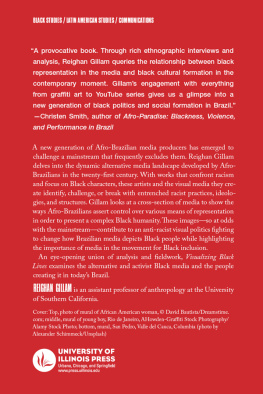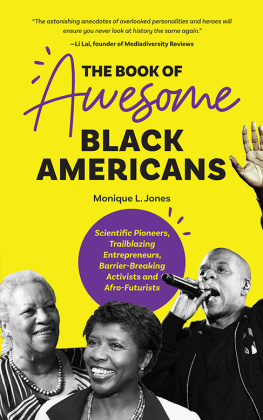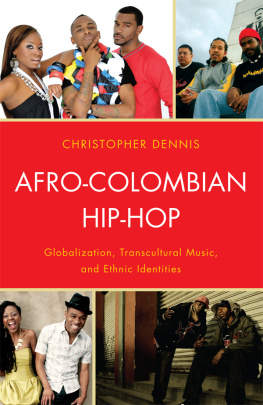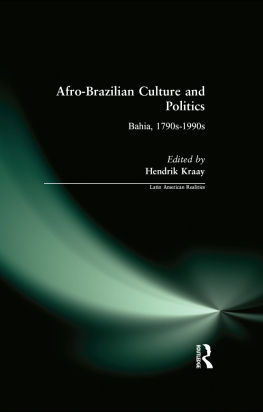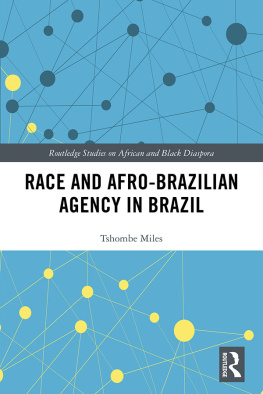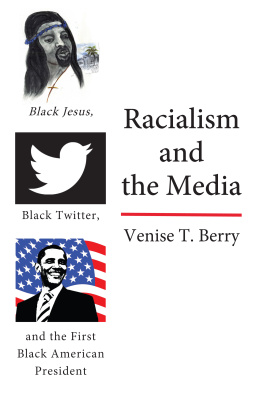Visualizing Black Lives
Ownership and Control in Afro-Brazilian Media
REIGHAN GILLAM

2022 by the Board of Trustees
of the University of Illinois
All rights reserved
Publication supported by a grant from the University of Illinois Press Fund for Anthropology.
Library of Congress Cataloging-in-Publication Data
Names: Gillam, Reighan, author.
Title: Visualizing Black lives : ownership and control in Afro-Brazilian media / Reighan Gillam.
Description: Urbana : University of Illinois Press, [2022] | Includes bibliographical references and index.
Identifiers: LCCN 2021046191 (print) | LCCN 2021046192 (ebook) | ISBN 9780252044410 (cloth) | ISBN 9780252086489 (paperback) | ISBN 9780252053405 (ebook)
Subjects: LCSH: Blacks and mass mediaBrazil. | Blacks in mass media. | Racism in mass media. | BrazilRace relations.
Classification: LCC P94.5.B552 B645 2022 (print) | LCC P94.5.B552 (ebook) | DDC 305.896/081dc23/eng/20211202
LC record available at https://lccn.loc.gov/2021046191
LC ebook record available at https://lccn.loc.gov/2021046192
For my parents, Warren and Dorothy Gillam
Acknowledgments
After years of researching and writing this book, I am happy to finally thank in print those who supported my journey. I am indebted to the people in Brazil who shared their lives and experiences with me. They welcomed me and agreed to help me by sharing their stories and recollections, as well as the media that they made. This research and book would not be possible without their insights and words.
The seeds for this project were planted while I was an undergraduate at the University of Virginia. Classes with Brian Owensby, David Haberly, and Mieka Brand Polanco introduced me to the African Diaspora and the history and culture of Brazil. Hanan Sabea and Wende Marshall provided mentorship, advice, and models for infusing academic work with social justice. The Institute for the Recruitment of Teachers greatly aided my transition from college to graduate school.
I had the good fortune of learning in community at Cornell University and in the Department of Anthropology. Viranjini Munasinghe first told me about TV da Gente, guided my project development, and instilled in me an appreciation for irony. I am thankful to have had guidance building my project from Jane Fajans, Carol Boyce Davies, Dominic Boyer, Audra Simpson, and Jacob Rigi. The late John Burdick kindly met with me in Syracuse to offer advice about my research. I truly enjoyed Jurandir Oliveira's Portuguese classes and his exuberant teaching style. A class and discussions with Micol Seigel contributed to my thinking about this book and planted seeds for future projects. My cohort of Ivan Small, Kate Harding, Krista Schoening, Olivia Hall, and Hong Bui provided camaraderie during out journey through graduate school. I am grateful for Ivan's friendship as we navigate academia and life one conference at a time. Tina Shrestha, Bernardo Brown, John Phan, and Nidhi Mahajan have been friends and sources of support in graduate school and beyond. A Five College Fellowship at Mount Holyoke College gave me the needed time and space to write my dissertation. While there, Joshua Roth, Debbora Battaglia, Britt Halvorson, and my students made my experience of life at the college quite enjoyable.
My colleagues at the University of Michigan and at the University of Southern California have provided intellectually stimulating environments and community. I am grateful for those who supported me, including Tiya Miles, Martha Jones, Frieda Ekotto, Meg Sweeney, Aswin Punathambekar, Robin Means Coleman, Susan Douglas, Yeidy Rivero, Nayan Shah, Dorinne Kondo, and Shazia Iftkhar. The late Fernando Arenas helped me improve my Portuguese and offered constant support and advice for the project. May he rest in peace. Katherine Sender read through manuscript chapters and offered invaluable comments and advice. At Michigan, I was involved with the Program for Research on Black Americans (PRBA) as well as the Women of Color in the Academy Project (WOCAP). Writing retreats with WOCAP and presentations at PRBA helped me to advance this book. I am grateful to have had been in community with William Calvo-Quirs, Aliyah Khan, and Kira Thurman at Michigan. At USC Nancy Lutkehaus and Lanita Jacobs kindly read chapter drafts and offered advice. Deborah Thomas and Joseph Straubhaar offered incisive readings of the entire manuscript. These thoughtful critiques and questions helped me to refine this book. Through writing groups, reading groups, and other gatherings throughout my time in LA, I am thankful to have gotten to know Natalie Belisle, Kirby Farah, Xochitl Ruiz, Emily Zeamer, Adrian de Leon, Alaina Morgan, Ronald Mendoza de Jesus, and Zakkiyah Iman Jackson.
The David Rockefeller Center for Latin American Studies (DRCLAS) at Harvard University gave me the time and space needed to revise the manuscript. I enjoyed gathering with the other fellows and benefited from their questions and advice, especially Rosemary Feal and Flvia Piovesan. Edwin Ortiz ensured that our time at DRCLAS was productive and comfortable. Jessica Welburn, Matthew Morrison, Christopher Ouma, ZZ Packer, and I met regularly to write, which contributed to my revising momentum. M. Gabriela Torres and Amy Moran-Thomas offered comments on a chapter that I presented at the anthropology working group that Ieva Jusionyte coordinated. I am grateful for the fellowship with Todne Thomas and N. Fadeke Castor in Cambridge.
The book benefited from comments and questions from audiences at talks at Brown University, Harvard University, University of Pennsylvania, University of Rochester, University of New Orleans, University College of London, Waseda University (Japan), the Role of Place in African American Autobiography NEH Institute, and the African Centered Cultural Expression NEH Institute.
I am grateful to my fellow Brazilianists who have offered comments on the work at conferences and during conversations: Gladys Mitchell-Walthour, Tianna Paschel, Kia Lilly Caldwell, Bryan Pitts, Jay Sosa, Aiala Levy, Daniel Gough, Jasmine Mitchell, Jonathan Square, Bryce Henson, Kim Butler, and Jaira Harrington. For their help and camaraderie in Brazil, I thank Marcio Macedo and Gabriela Watson-Burkett. Leticia Stanchi Pereira, Domnica Oliveira, and Roseangela Malachias offered me the gift of friendship during my fieldwork, for which I am truly grateful.
I remain grateful for the friendships of Elizabeth Hinton, Jennifer Eaglin, Deniqua Crichlow, Martin Fischoff, Mike Henry, Walter Middlebrooks, and Colleen MacNett, my oldest friend. They help me forget about work and enjoy life.
At the University of Illinois Press, Marika Cristofides believed in the project from the beginning and expertly shepherded the manuscript through review. Dawn Durante adeptly picked up the project after Marika's departure, and Alison Syring Bassford's capable hands saw the project through to the end. I thank the anonymous reviewers, whose comments further improved this book.
My family has been a source of constant support as they have patiently watched me complete this book. My parents, Warren and Dorothy Gillam, were my first teachers, and to them I owe everything. I am grateful for my aunts and cousins, whose care has sustained me throughout my life. The Curry family has offered constant support and encouragement during this long journey. Milton S. F. Curry has been a steadfast partner in all things, and your constant optimism keeps me going.

